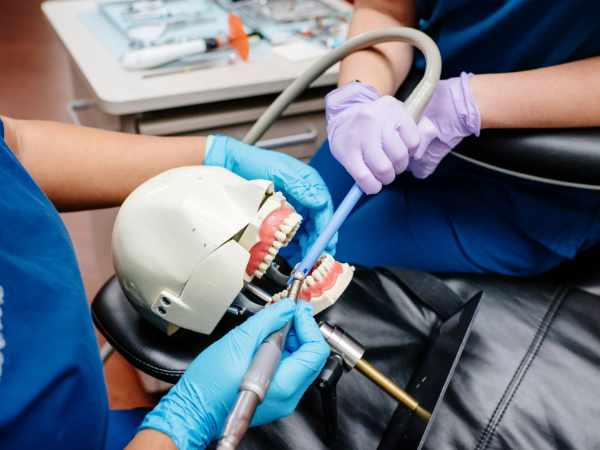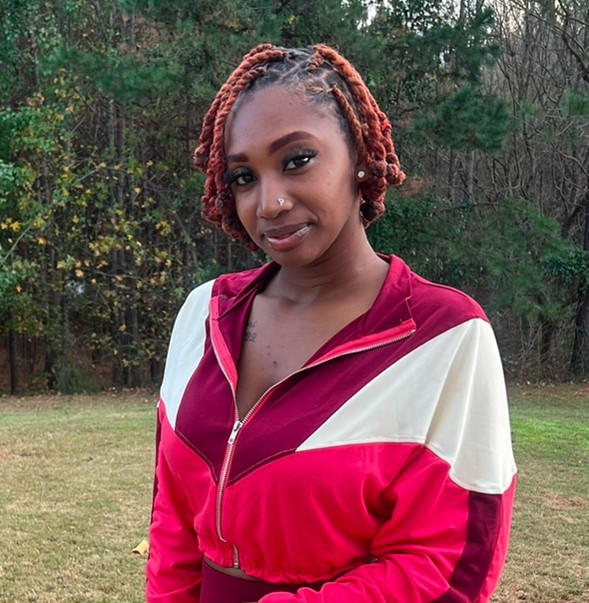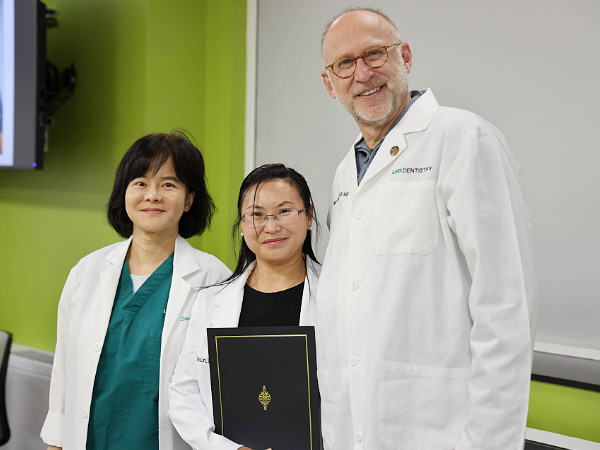The University of Alabama at Birmingham School of Dentistry was one of the first places to experience the benefits of having more eyes and hands taking care of a patient. What once was strictly a solo profession in terms of actually working on teeth expanded in the 1960s when UAB participated in government-funded research involving a technique called “four-handed dentistry.”
 UAB SOD Dental Assisting Program students training on dummyToday, both dental hygienists and dental assistants are commonplace in a dental practice. And UAB continues to play a vital role in preparing some of these helping hands through the SOD’s Dental Assisting Program. The program includes lectures, demonstrations and rotations within both the SOD and private dental offices, where students engage in broad-based clinical experiences.
UAB SOD Dental Assisting Program students training on dummyToday, both dental hygienists and dental assistants are commonplace in a dental practice. And UAB continues to play a vital role in preparing some of these helping hands through the SOD’s Dental Assisting Program. The program includes lectures, demonstrations and rotations within both the SOD and private dental offices, where students engage in broad-based clinical experiences.
“It is the first steppingstone into a career in dentistry, to figure out how far you want to go,” says program director Kelly McNealey, who is a graduate of the program herself. “It gives students a really broad foundation in dentistry and allows them to enter the workforce as skilled assistants. A lot of them go on to become dental hygienists, and some even go to dental school after that.
“We are teaching the full gamut of professionalism. Learning to use your hands, and the dexterity that is necessary to work in dentistry. Having to work in a small, focused area. We have classes ranging from basic communication with patients to dealing with medical emergencies. Mainly just everything about learning how to work in a professional environment as part of a team.”
McNealey says the program is ideal for people who did not go directly to college out of high school and are now looking for a professional career with opportunities for advancement.
 D'Nesha McClendonFor example, current student D’Nesha McClendon was looking for a new opportunity after spending five years in the United States Army. McClendon, who is on track to graduate in the spring, says she chose the Dental Assisting Program because, “I’ve always liked being around people, and I’ve always found it interesting going to the dentist. I don’t know why.
D'Nesha McClendonFor example, current student D’Nesha McClendon was looking for a new opportunity after spending five years in the United States Army. McClendon, who is on track to graduate in the spring, says she chose the Dental Assisting Program because, “I’ve always liked being around people, and I’ve always found it interesting going to the dentist. I don’t know why.
“It’s a wonderful program. I’ve learned a lot. I recently went to the dentist for my own appointment and I knew all the teeth numbers. We’ve done work on mannequins. We get to shadow students in clinic. And we have great teachers. They really take the time to help us understand everything.”
McNealey says she emphasizes to students the importance of the role they are being trained to do. Because unlike in the early days of the profession, today’s dentists rely heavily on dental assistants in order to efficiently take care of patients.
“Having a skilled dental assistant can be invaluable,” McNealey says. “There are dentists who when their dental assistant takes vacation, they take vacation, because they don’t want to work without them. The dental assistant offers both patient care and customer service. We want to make sure that going to the dentist is the best experience possible for our patients.”
 Lin (center) with Dr. Fu (left) and Dean Geurs (right)That’s also what attracted Yan Lin, a Chinese-born mother of three whose husband is a professor at the University of Alabama, to the program. After spending much of the past 15 years focusing on raising her children, Lin decided she wanted a professional career for herself. She was motivated by the crucial role dental assistants play in patient care.
Lin (center) with Dr. Fu (left) and Dean Geurs (right)That’s also what attracted Yan Lin, a Chinese-born mother of three whose husband is a professor at the University of Alabama, to the program. After spending much of the past 15 years focusing on raising her children, Lin decided she wanted a professional career for herself. She was motivated by the crucial role dental assistants play in patient care.
"When I go to see the dentist, the dental assistant is the first person who makes me feel so comfortable during the visit. This inspired me to pursue dental assisting as a career. I find it very gratifying to help others and play a part in giving them confidence in their smiles,” she says.
A member of the winter 2024 graduating class, Lin says she is well-prepared and ready to take the next step.
“The carefully designed lectures and demonstrations within the school from dedicated faculty gave me valuable knowledge about oral health. The rotation in the broad-based clinics helped me with hands-on experience in pursuing a career in oral health,” she shared.
McNealey credits Lin for providing quiet leadership for her class, saying, “She is a wonderful student who has worked so hard this past year.”
In recognition of her efforts, Lin was presented with an award for clinical excellence at the program’s winter graduation ceremony.